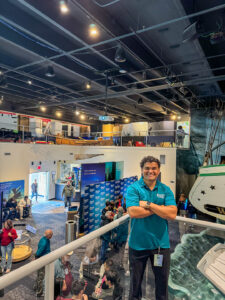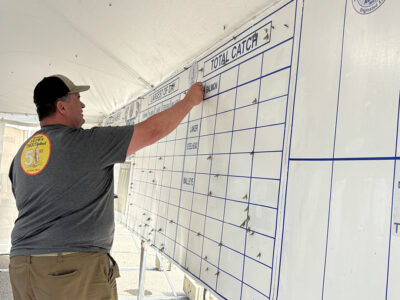Naval cadets get firsthand training, research knowledge in Thunder Bay

News Photo by Zipporah Abarca Gavin Prusakiewicc (right) explains the operations of navigating the former Navy vessel while Captain Luke Clyburn (left) and fellow sea cadet Binnie Dziengowski (middle) listens.
ALPENA — Docked at the Alpena Marina is the Pride of Michigan United States Naval Sea Cadet Corps training vessel.
Sea cadets ages 13 to 17 on board are receiving experience with shipboard and naval training and researching shipwrecks, sinkholes and ancient forests.
The U.S. Naval Sea Cadet Division’s mission with this program is to “educate and instill a desire to learn about our environment and the Great Lakes … by giving cadets the tools, training and mentoring…” to do so.
Pride of Michigan Captain Luke Clyburn said the former Navy vessel being used for training runs two programs, the Sea Cadet, for 13- to 17-year-olds, and the Navy League for 10- to 12-year-olds. The on-board training lasts 10 days, but started as early as the winter for prior education.
The program was federally chartered by Congress in 1962 as a nonprofit youth organization – 51 years ago in Oakland County. In 1974, the law was amended to incorporate female participants, according to the Sea Cadet Corps website.

News Photo by Zipporah Abarca
Clyburn said the purpose of the program is to develop maritime interests within American youth. Cadets on board come from all over the U.S.
“The history of this part of the world is so unique that people don’t really know about it,” Clyburn said.
There are about 25 people on the ship – all consisting of volunteers such as the cadets, officers, Clyburn and some of the cadet’s parents working on board. Most of them come from Wayne, Oakland and Macomb counties.
Gavin Prusakiewicc, from Elmont, said it hasn’t been too bad being away from home for long periods of time because his father is an officer operating the ship with him.
Binnie Dziengowski, from Royal Oak, said his parents work on deck and in the kitchen so being away from home on the Great Lakes doesn’t affect him much.

News Photo by Zipporah Abarca Some of the sea cadets rest in their bed chambers as others do their operational chores and a few lead a tour of the former Navy vessel.
Clyburn said with the cadets learning numerous skills, they could go into the Navy or Coast Guard at the rate they earn as a cadet and make a higher pay grade.
There have been 14 films the Great Lakes Division U.S. Naval Sea Cadet Corps created revolving around the history and research within the Great Lakes that the Pride of Michigan has taken part in. Clyburn said they have found underwater forests with wood almost 7,000 years old in Lake Huron.
“…with teaching scuba diving, they (cadets) get to see the shipwrecks,” he said. “But the history of this part of the world goes way beyond the shipwrecks, and right here in Thunder Bay, you’ve got evidence of that pre-culture.”
With about 15 cadets on board, it offers more eyes to scan large areas versus the capability of a sonar, Clyburn said. This reveals more opportunities for advancements in research.
Prusakiewicc said his personal goal is to achieve his deepest dive. So far, he has seen the depths of 70 feet, but is excited for his 120 feet dive on Thursday before departing from Alpena.

News Photo by Zipporah Abarca Belle, the Pride of Michigan’s sea dog, lays in the crew's bed chambers by the doorway for a nap.
“Scuba diving is really fun … it feels like you’re in space,” he said.
Besides venturing into the water with scuba diving, cadets are taught and given the responsibility to operate the ship. This includes steering the boat to navigate, engine operations and shiphandling.
Dziengowski said he has learned a lot about ships and has received experience to further his knowledge and better prepare him for making smarter choices in the future.
“We’ve got a number of our cadets from past years (who) are out running … 1,000-foot freighters,” Clyburn said. “They’re engineers or [working in] an engine room, they’re steering — so the program has paid off not only for military, but just putting young people into the maritime industry.
I’ve been very happy to work with them and see the results of it and feel like it’s very much worthwhile. What makes this training so valuable? Teamwork. They’re learning that if they don’t work as a team, it doesn’t work.”

News Photo by Zipporah Abarca Sea Cadets ages 13 through 17 stand aboard the Pride of Michigan U.S. Naval Sea Cadet Corps training vessel before their departure the following day to their next location for training and research.
The ship has made its way to Alpena due to its relationship with the National Oceanic and Atmospheric Administration.
Clyburn said it has been great to work with the organization and return to Alpena’s docks because of the resources available and the experienced marine archaeologists that live here.
Due to the COVID-19 pandemic, the program lost a number of cadets – previously averaging about 30 sea cadets – and also has seen a depletion of experienced scuba divers.
Clyburn said their weeklong stay in Alpena has been to focus on training the cadets to become professional divers.
Beyond Alpena, Clyburn said they are exploring a research project into Lake St. Clair about the underwater ghost town of Belvidere.
Now, the Pride of Michigan is seeking to learn more about the history of the ancient people that lived there, Clyburn said. Cadets on board will participate in that project as well.
This story was produced as part of the Michigan News Group Internship. Zipporah Abarca is working for WCMU this summer at The Alpena News.
- News Photo by Zipporah Abarca Gavin Prusakiewicc (right) explains the operations of navigating the former Navy vessel while Captain Luke Clyburn (left) and fellow sea cadet Binnie Dziengowski (middle) listens.
- News Photo by Zipporah Abarca
- News Photo by Zipporah Abarca Some of the sea cadets rest in their bed chambers as others do their operational chores and a few lead a tour of the former Navy vessel.
- News Photo by Zipporah Abarca Belle, the Pride of Michigan’s sea dog, lays in the crew’s bed chambers by the doorway for a nap.
- News Photo by Zipporah Abarca Sea Cadets ages 13 through 17 stand aboard the Pride of Michigan U.S. Naval Sea Cadet Corps training vessel before their departure the following day to their next location for training and research.










